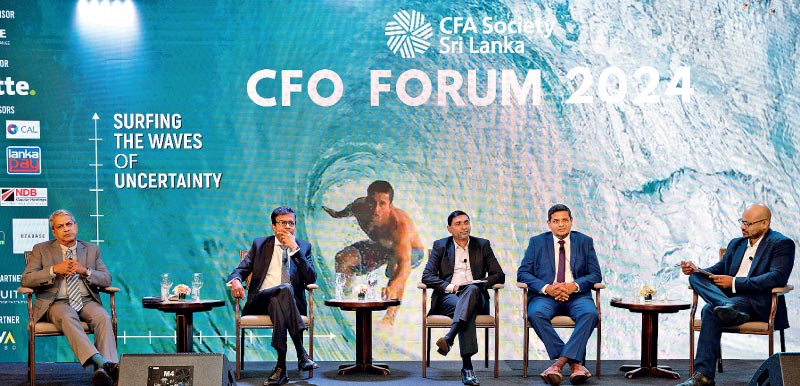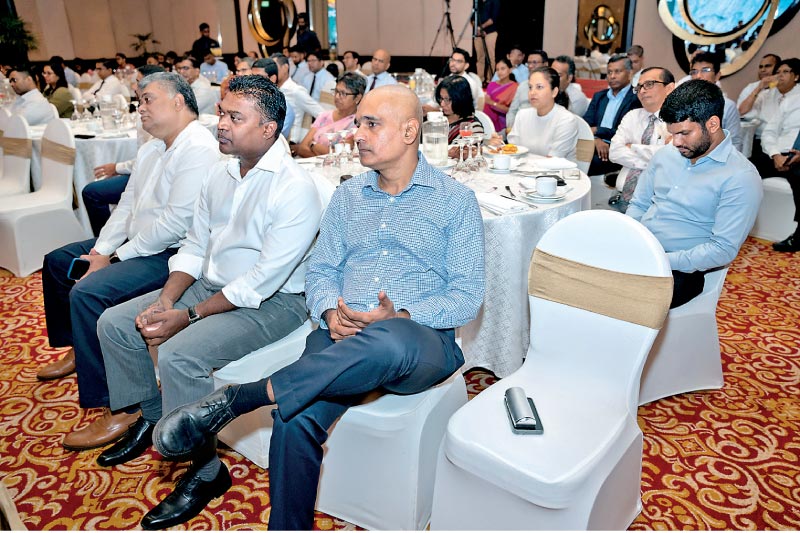Tuesday Feb 17, 2026
Tuesday Feb 17, 2026
Monday, 22 July 2024 00:00 - - {{hitsCtrl.values.hits}}

CFASSL CFO Forum panel discussion in progress
|
CFASSL President Aruna Perera delivers the welcome address
|
A CFO Forum organised by the CFA Society Sri Lanka was held on Tuesday, 16 July at the King’s Court, Cinnamon Lakeside, Colombo, with the aim of providing a robust platform for finance professionals to discuss and navigate the complexities of today’s economic environment.
The role of Chief Financial Officers (CFOs) has undergone a remarkable transformation in recent years. Once primarily concerned with budgetary allocations, financial reporting and risk management, today’s CFOs are pivotal strategic leaders within their organisations. This evolution was a central theme at the forum, which aimed to facilitate the exchange of knowledge and best practices among CFOs, thereby enabling them to transform challenges into opportunities that drive organisations towards sustainable growth.
Delivering the welcome address, CFA Society Sri Lanka President Aruna Perera, CFA, emphasised the above objective and noted that the forum sought to create a platform for finance professionals to discuss and share insights and strategies on navigating the complexities of today’s economic environment. He highlighted several key discussion points including major macro and micro-economic challenges faced by businesses, financing strategies, identifying and capitalising on growth opportunities, leveraging rapidly evolving technology, and incorporating sustainability into the decision-making process.
The welcome address was followed by a panel discussion featuring Commercial Bank of Ceylon PLC CFO Nandika Buddhipala, John Keells Holdings PLC Group Financial Controller Mohan Thanthirige, Fitch Rating Lanka Ltd. Managing Director and CEO Maninda Wickramasinghe, and LSEG Finance Centre of Excellence, Sri Lanka Director/CFO and Co-Head Fadhil Jiffry, and moderated by Acuity Knowledge Partners Senior Director – Specialised Solutions Chamara Gunetileke, CFA.
The discussion encapsulated several core themes including the evolution of the CFO role, internal competency gaps, external challenges facing the CFO function in the short and long term, as well as industry-specific insights.
Imperative for CFOs to be able to synthesise and articulate unique perspectives
Commenting specifically on the banking sector, the panel highlighted the growing need for CFOs to formulate their own perspectives on strategic aspects by being cognizant of market signals and maintaining affiliations across the organisation and industry to better understand ground realities.
Highlighting several scenarios, the panel commented: “CFOs need to have a point of view on capital levels; you need to have a point of view on where, when, at what cost and how [organisations] can raise capital.” They also noted that within the banking sector, CFOs must have an idea of where and why lending ought to be extended in a manner that reduces portfolio concentration, manages risk and supports long-term growth.
Treasury management; a vital unaddressed gap across small and medium-sized corporates
The panel noted that the CFO office needs to adeptly manage treasury responsibilities, ensuring effective cash flow and investment strategies in the absence of dedicated treasury departments. Evidencing this competency gap, they pointed to the lack of participation by non-banking corporates in raising long tenure financing during the low interest rate environment during 2019-2020.
Remarking on potential remedies, the panel said: “If you don’t have it [treasury management competencies] in-house, don’t hesitate to outsource that work. Go to an investment bank and ask them what to do.” They added that conversely, financial intermediaries such as investment banks on their part need to proactively reach out to corporates with tailored solutions.
Answering a question on the nature of debt funding, one panellist pointed out that many corporates are on the shorter end of markets, given easy access to banking finance. The panellist noted that this makes them vulnerable to interest rate movements. In terms of risk, corporates need to look at alternative mechanisms and structures such as secured finance. The exposures in terms of risk are significant.
CFOs need to transcend conventional risk management systems to navigate uncertainties
Speaking on risk management measures, the panel remarked that traditional stress testing frameworks used by CFOs typically account for only marginal deviations in interest rates, inflation and currency fluctuations, and fall short in anticipating black swan events, such as the economic crisis.
In light of this, the panel emphasised the need for CFOs to be vigilant on market signals and the limitations of the conventional stress testing frameworks to be able to proactively alert the CEO and board members of potential risks, and proactively seek remedial measures to mitigate negative repercussions on cash flow, profitability and business growth.
Increased regulatory compliance and sustainability requirements present challenges and opportunities
With respect to the regulatory front, the panel drew attention to increasingly stringent compliance requirements, particularly directed at preventing fraudulent activities. They noted that CFOs must stay abreast of regulatory changes and implement necessary compliance measures, adding that it is essential to have monitoring systems in place, as failure to comply can result in substantial fines and serious reputational damage.
Commenting on the readiness of the CFO’s office to capture opportunities amid increasing stakeholder interest in environmental, sustainability and governance (ESG) practices, the panel said: “The finance sector is uniquely positioned to champion sustainability initiatives, as it’s geared towards quantifying impacts.”
The panel elaborated: “Some funding agencies where when we try to approach, they will ask what your ESG governance structure is, what your ESG strategy is, what techniques and tools are used to measure risks, and the metrics and targets. They start from this point.” Therefore, it’s of imperative importance that the CFO office integrates ESG factors into financing strategies to be able to address these questions from the outset.
Touching on the broader topic of stakeholder management, the panellists also pointed towards the need for the CFO to collaborate in cross-functional teams to draw on the expertise and unique strengths to build strong teams capable of delivering a compelling investment pitch to prospective investors. They further added that beyond the initial pitch and securing of investments, the CFO’s office needs to play an active role in nurturing a mutually beneficial partnership with investors by providing comprehensive updates in a timely manner.
Technology innovation remains a balancing act
In relation to technology innovation, the panel said: “The reality is that especially when it comes to large multinational entities, you have to balance innovation with risk management and sustainable growth.” They highlighted concerns about information security and governance, and the unpredictability associated with emerging technologies, such as generative artificial intelligence, as reasons that cause larger corporates to take a more measured approach when adopting these technological advances.
Answering a question on time allocation towards innovation and new business ideas, one panellist remarked: “On innovation, there are two facets – stress-based innovation and business as usual (BAU) innovation – with the former being the dominant aspect over the last two years. We were forced to innovate to survive on BAU at 10-20%.”
Other panellists also noted internal measures taken including creating internal start-up incubator projects where funding and guidance is made available, collaborating with international organisations to create platforms for entrepreneurs to come together and showcase their ideas and connect with others, and running entrepreneurship knowledge and skills development workshops.
Attracting and retaining talent continues to be a top-of-the-mind challenge
Speaking with an emphasis on the knowledge sector, the panel iterated that attracting and retaining talent remains a significant challenge complicated by economic volatility and currency fluctuations. One panellist commented that “despite these challenges, Sri Lanka remains an attractive destination for knowledge process outsourcing (KPO) due to its strong educational infrastructure,” with the others in agreement that investments are needed in higher education to develop the skilled workforce needed for long-term success.
To address the brain drain issue, the panel emphasised the need to incorporate diversity, equity and inclusion (DEI) practices so as to foster an environment where younger employees perceive themselves to have a fair opportunity for progress and prosperity. They noted that management including the CFO needs to engage with the younger cohorts to understand and address their concerns, as well as reconsider traditional notions surrounding work arrangements and conventions. Other potential areas to consider were offering attractive compensation packages, and robust training and development programs.
In their closing remarks, the panellists observed that there exists significant scope for CFOs and investment banks to collaborate in exploring financial engineering solutions to improve capital efficiency, as well as using fund strategies to capture opportunities within the realms of ESG and education.
One panellist put forth the idea of utilising an ESG/sustainability fund to attract investors and drive the sustainability initiatives particularly in the energy sector. The panellist also suggested corporates partnering to create an educational trust fund that can be utilised to create private universities or colleges, which in turn would provide a growing competent talent pool capable of bridging the current resource gap and enabling the scale up of the KPO sector within the country.

CFOs in the audience